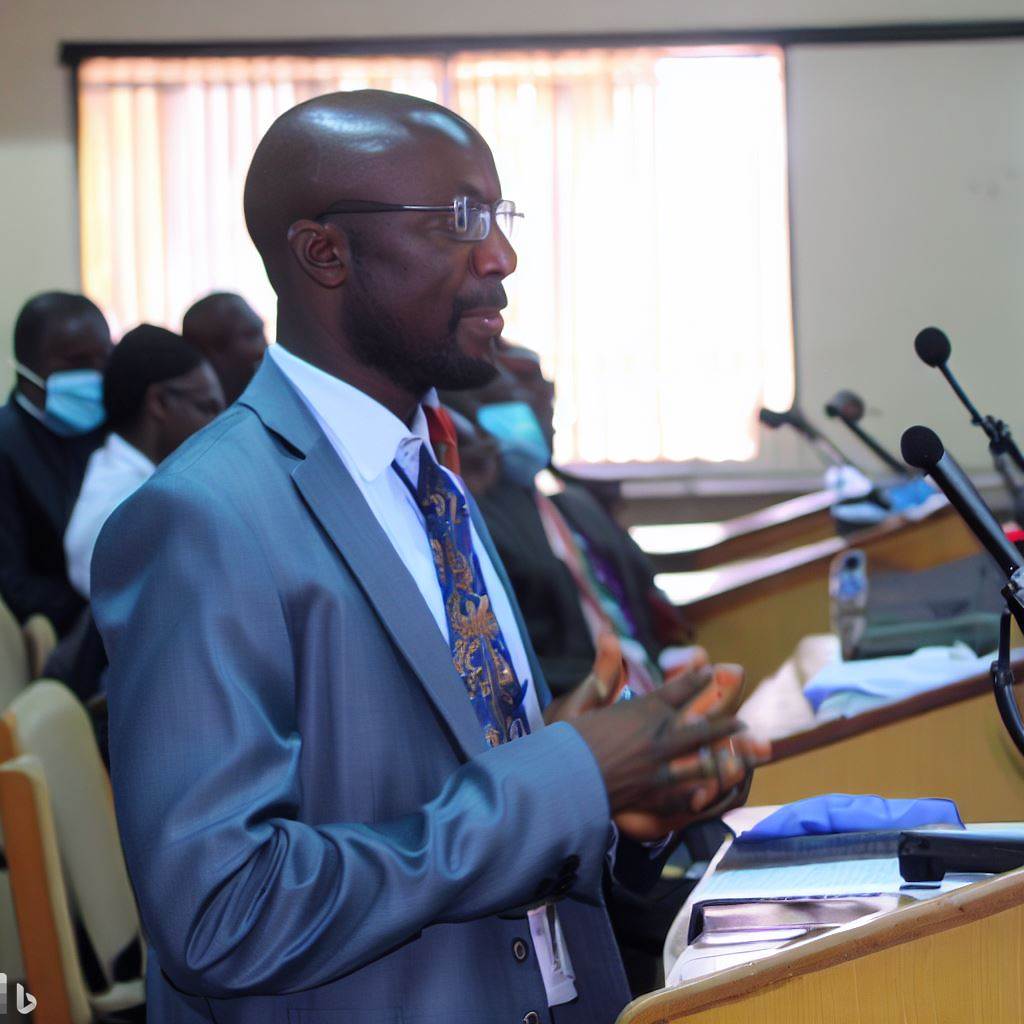Introduction
Biomedical engineering education merges engineering principles with healthcare and medical exploration.
This intricate field plays a pivotal role in revolutionizing health services.
Delving into the Nigerian context, the status of biomedical engineering education within the country demands attention.
Embarking on a journey into biomedical engineering education involves the fusion of engineering finesse with healthcare innovation.
This synergy orchestrates advancements in medical solutions. A closer look at Nigeria unveils the pressing need to evaluate and enhance the landscape of biomedical engineering education.
The realm of biomedical engineering education seamlessly weaves technical proficiency into medical marvels. Within Nigeria, this dynamic intertwining calls for thorough scrutiny and amelioration.
Nigeria stands at the crossroads of bolstering biomedical engineering education. The urgency to uplift this sector resonates profoundly for improved healthcare and innovative medical breakthroughs.
The exploration of biomedical engineering education finds its focal point in Nigeria’s transformative journey.
Elevating the standards in this sector remains an imperative stride towards elevated healthcare mechanisms and inventive medical strides.
Overview of Biomedical Engineering Education in Nigeria
Discuss the history and emergence of biomedical engineering education in Nigeria
- Biomedical engineering education in Nigeria has evolved over the years to meet the healthcare challenges of the nation.
- It emerged as a response to the increasing need for trained professionals in the healthcare sector.
- The first biomedical engineering program in Nigeria was established in the early 1980s.
- Since then, the field has witnessed significant growth and development.
- Biomedical engineering education in Nigeria now aims to bridge the gap between engineering and medicine.
Highlight the key institutions offering biomedical engineering programs in the country
- University of Lagos offers a Bachelor’s degree in Biomedical Engineering.
- Other prominent institutions include University of Nigeria, Ahmadu Bello University, and Obafemi Awolowo University.
- These institutions provide quality education and training in the field of biomedical engineering.
- They have state-of-the-art facilities and experienced faculty members.
- Students can pursue undergraduate, postgraduate, and doctoral programs in biomedical engineering.
Discuss the curriculum and courses typically offered in biomedical engineering programs in Nigeria
- Biomedical engineering programs in Nigeria offer a multidisciplinary curriculum.
- Students are exposed to a wide range of courses, including engineering, biology, and medical sciences.
- Common courses include biomedical instrumentation, medical imaging, biomaterials, and medical ethics.
- Students also learn about healthcare systems, regulatory standards, and quality assurance in healthcare.
- Hands-on practical sessions and laboratory work are integral parts of the curriculum.
Furthermore, internships and industrial training programs provide students with real-world experience.
The curriculum is regularly updated to keep up with advancements in technology and healthcare practices.
Students are encouraged to participate in research projects and undertake independent studies.
Overall, the curriculum equips students with the necessary knowledge and skills to contribute to the field of biomedical engineering.
In fact, biomedical engineering education in Nigeria has come a long way.
It has emerged as a vital field of study, addressing the healthcare needs of the nation.
With top institutions offering comprehensive programs and a robust curriculum, students are well-prepared for the challenges of the field.
Biomedical engineers in Nigeria play a crucial role in improving healthcare delivery and making a positive impact on society.
Challenges in Biomedical Engineering Education in Nigeria
Lack of proper infrastructure and equipment for practical training
The lack of adequate facilities and equipment hinders effective practical training in biomedical engineering.
Inadequate funding for research and development in the field
Insufficient financial support for research and development activities restricts innovation and progress in the field.
Shortage of qualified and experienced faculty members
The limited availability of skilled and experienced faculty members affects the quality of education in biomedical engineering.
Limited opportunities for internships and industrial exposure
The lack of accessible internships and industrial exposure limits practical experience and industry relevance for students.
Inadequate collaboration between academia and industry
The lack of collaboration between academic institutions and industry hampers knowledge transfer and real-world application of biomedical engineering.
Limited availability of updated and relevant study materials
The scarcity of up-to-date and relevant study materials hinders the acquisition of current knowledge and skills in biomedical engineering.
Biomedical engineering education in Nigeria encounters multifaceted challenges that impede its quality and efficacy.
One primary hurdle is the dearth of suitable infrastructure and equipment for practical training.
Essential hands-on experiences demand well-equipped labs and facilities, but many institutions struggle, hindering student practicality.
Moreover, insufficient research and development funding stymies the progress of biomedical engineering education.
Limited financial support constrains innovation and technology advancement, slowing the field’s growth.
Faculty shortages pose another obstacle. The specialized nature of biomedical engineering demands adept educators, yet Nigeria grapples with a shortage of qualified faculty, compromising education excellence.
Scarce internships and industry exposure opportunities contribute to the challenge.
Real-world application is crucial, but Nigeria lacks accessible industry connections, depriving students of valuable experience.
The gap between academia and industry further hampers education.
Collaboration is vital for knowledge exchange and practical projects, yet current limitations stifle its potential.
Additionally, outdated study materials exacerbate these issues.
Biomedical engineering’s rapid evolution necessitates up-to-date resources, which Nigeria lacks, inhibiting students from staying current.
In short, Nigerian biomedical engineering education confronts a spectrum of challenges—limited infrastructure, funding, faculty, industry ties, and updated materials.
Addressing these is pivotal for robust, effective education.
Read: The State of Robotics Education in Nigerian Schools

Efforts and Initiatives to Improve Biomedical Engineering Education in Nigeria
Government interventions and policies to enhance biomedical engineering education
- The Nigerian government has implemented various interventions and policies to improve biomedical engineering education.
- These initiatives aim to strengthen the curricula, upgrade faculty qualifications, and enhance research capabilities.
- Government funding has been directed towards improving infrastructure, equipment, and laboratory facilities in universities.
- Policies have been put in place to ensure that all biomedical engineering programs meet international standards and accreditation requirements.
- The government has also established regulatory bodies to oversee the quality and consistency of biomedical engineering education in the country.
Collaborations with international institutions and organizations to improve educational standards
- Nigerian universities have formed partnerships with renowned international institutions and organizations.
- These collaborations facilitate knowledge exchange, faculty development programs, and research collaborations.
- Through these partnerships, Nigerian students and faculty members gain exposure to global best practices in biomedical engineering education.
- International collaborations also provide opportunities for students to participate in exchange programs and internships abroad.
- These collaborations contribute to improving the overall quality and relevance of biomedical engineering education in Nigeria.
Efforts by local universities to upgrade infrastructure and facilities
- Local universities in Nigeria have recognized the importance of having modern infrastructure and state-of-the-art facilities.
- Efforts have been made to upgrade existing laboratories, acquire advanced equipment, and improve teaching spaces.
- These upgrades enhance hands-on learning experiences and provide students with practical skills required in the field.
- Local universities have also invested in research facilities to foster innovation and scientific discoveries in biomedical engineering.
- Continuous efforts are being made to maintain and upgrade the infrastructure to meet evolving educational needs.
Scholarships and grants to encourage more students to pursue biomedical engineering
- To encourage more students to pursue biomedical engineering, scholarships and grants are being offered.
- These financial incentives help alleviate the burden of tuition fees and attract talented students to the field.
- Scholarships are available for both undergraduate and postgraduate students pursuing biomedical engineering programs.
- By providing financial support, more students can access quality education and contribute to the advancement of the field.
- These scholarships and grants play a vital role in increasing the number of qualified biomedical engineers in Nigeria.
Professional development programs for faculty members to enhance teaching and research skills
- Local universities and professional organizations organize regular professional development programs for faculty members.
- These programs focus on enhancing teaching methodologies, research skills, and the application of new technologies in teaching.
- Faculty members participate in workshops, seminars, and conferences to stay updated with advancements in biomedical engineering.
- Professional development programs foster a culture of continuous learning and improvement among educators.
- By equipping faculty members with the necessary skills, the quality of teaching and research in biomedical engineering is enhanced.
Read: Understanding the Role of Biomedical Engineers in Nigeria
Success Stories and Notable Achievements in Nigerian Biomedical Engineering Education
Highlight success stories of Nigerian biomedical engineering graduates
- Emeka Okafor, a Nigerian biomedical engineering graduate, developed low-cost prosthetic limbs for amputees.
- Adaobi Osakwe, another Nigerian graduate, designed a smart pillbox that helps patients manage their medication.
- Tunde Adeniran, a renowned Nigerian biomedical engineer, successfully developed a portable ultrasound machine.
- Chika Onyebuchi, a graduate of biomedical engineering, founded a medical device company that produces innovative healthcare solutions.
- Nkechi Okoli, a Nigerian graduate, invented a non-invasive glucose monitoring device for diabetic patients.
Discuss notable research projects and innovations by Nigerian biomedical engineering students and professionals:
- A team of Nigerian biomedical engineering students developed a low-cost prosthetic hand using 3D printing technology.
- Researchers from a Nigerian university designed a wearable electrocardiogram (ECG) device for monitoring heart health.
- A group of Nigerian biomedical engineers developed a smartphone app that can detect malaria parasites in blood samples.
- Nigerian biomedical engineering professionals collaborated with international partners to create a robotic exoskeleton for rehabilitation purposes.
- Students from a Nigerian university successfully built a working prototype of an artificial pancreas for diabetes management.
Share instances where Nigerian biomedical engineers have made significant contributions to the global field:
- Dr. Adekunle Oloyede, a Nigerian biomedical engineer, received international recognition for his groundbreaking research on bioelectronics.
- Prof. Ifeoma Okoye, a Nigerian professor of biomedical engineering, was awarded for her contributions to tissue engineering.
- Nigerian biomedical engineers played a crucial role in the development of a portable infant incubator for use in low-resource settings globally.
- Dr. Ahmed Yusuf, a Nigerian biomedical engineer, published a breakthrough study on the use of nanotechnology in cancer treatment.
- Several Nigerian biomedical engineering professionals have been invited as keynote speakers at international conferences to share their expertise.
Nigerian biomedical engineering education has produced exceptional graduates, leading research projects, and contributing significantly to the global field.
These success stories and notable achievements serve as inspiring examples for current and future students in the field.
Read: The Future of Biomedical Engineering in Nigeria
Future Outlook and Recommendations
Potential Growth and Expansion of Biomedical Engineering Education in Nigeria
Biomedical engineering education in Nigeria has immense potential for growth and expansion.
With the increasing demand for healthcare services in the country, there is a growing need for skilled biomedical engineers to develop innovative solutions to address medical challenges.
By capitalizing on this demand, Nigeria can establish itself as a hub for biomedical engineering education in Africa.
Furthermore, fostering partnerships between local universities and international institutions can bring in expertise from other countries, facilitating knowledge transfer and enhancing the quality of education.
These collaborations can also lead to joint research projects and student exchange programs, providing Nigerian students with exposure to global advancements in biomedical engineering.
Read: Universities Offering Robotics Engineering in Nigeria
Recommendations to Address Existing Challenges and Improve the State of Biomedical Engineering Education
To improve the state of biomedical engineering education in Nigeria, several recommendations can be implemented:
- Curriculum Enhancement: Regularly update the curriculum to align with advancements in technology and emerging trends in healthcare.
Incorporate practical hands-on training and internships to provide students with real-world experiences. - Faculty Development: Support the professional growth of faculty members by providing opportunities for continuing education, research grants, and participation in conferences and seminars.
This will enhance their expertise and contribute to a higher quality of education. - Quality Assurance: Develop a robust accreditation process to ensure that biomedical engineering programs meet international standards.
Implement a system for regular evaluation and assessment of program outcomes. - Industry Collaboration: Foster partnerships between universities and healthcare institutions or medical device companies.
This collaboration can create opportunities for internships, research collaborations, and industry-driven curriculum development. - Research and Innovation: Encourage students and faculty members to engage in research and innovation by establishing dedicated research centers and funding mechanisms.
This will contribute to the development of indigenous medical technologies and solutions tailored to the Nigerian healthcare system.
Importance of Continuous Support and Investment for a Brighter Future
Continuous support and investment in biomedical engineering education are crucial for Nigeria to realize its potential in this field.
By investing in infrastructure, research facilities, and faculty development, the government can create an enabling environment for growth and innovation.
Furthermore, continuous financial support for students through scholarships and grants will make education in biomedical engineering more accessible to talented individuals from disadvantaged backgrounds.
This inclusivity will ensure a diverse pool of professionals who can contribute to solving healthcare challenges in Nigeria.
The future outlook for biomedical engineering education in Nigeria is promising.
By embracing potential growth, implementing necessary recommendations, and maintaining continuous support and investment, Nigeria can establish itself as a leading force in biomedical engineering education in Africa.
This will not only address the existing challenges but also pave the way for a brighter and healthier future for the nation.
Read: How to Become a Biomedical Engineer in Nigeria
Conclusion
This article delved into the existing landscape of biomedical engineering education within Nigeria.
This educational aspect plays a pivotal role in propelling healthcare and technological progress in the country.
To pave the way for an improved future, it is imperative that we channel efforts towards enhancing and investing in biomedical engineering education.
Through these endeavors, we have the potential to revolutionize the field and subsequently elevate the healthcare sector throughout Nigeria.
The government and educational institutions should collaborate to increase the number of accredited biomedical engineering programs across the country.
This expansion would ensure that more students have access to quality education in this field, thus addressing the current shortage of skilled biomedical engineers.




